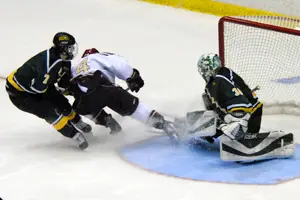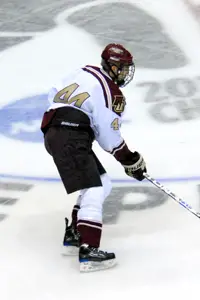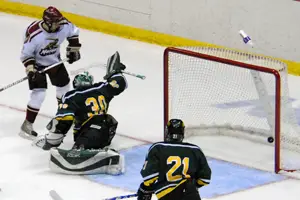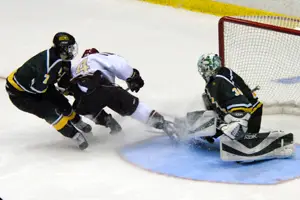So, the weekend has passed, the tournament invitations have been handed out, and now, 16 teams and eight Hobey Baker finalists are going on to the NCAA tournament.
Of course, the main focus this coming weekend will be on the teams, and it should be. With a trip to the Frozen Four hanging in the balance, any talk of individual honors will be secondary, and rightfully so. That said, however, this weekend will be the last chance for eight players to make their case for the Hobey Baker Award.
Of course, for the two Hobey finalists who won’t be playing this weekend – Maine’s Gustav Nyquist and RPI’s Chase Polacek – all that’s left to do is watch and wait. This is more true of Nyquist than Polacek, as I think that in Polacek’s case (to borrow some Oscars terminology), “the nomination is the win.” However, as Nyquist remains the nation’s leader in points per game, the Black Bear sophomore remains a contender to make the Hobey Hat Trick. Of course, the Hobey voters tend to reward players who make the NCAA tournament, but given that Matt Carle won the 2006 Hobey in a year when Denver missed the tournament, it’s not out of the question for Nyquist to make the Hat Trick.
I think there’s at least one spot in the Hobey Hat Trick that’s up for grabs this weekend, possibly more. For a while now, I’ve worked under the assumption that Denver goalie Marc Cheverie was a shoo-in for the Hat Trick, but I’m starting to waver on that assumption, due to the presence of Cornell and goalie Ben Scrivens in the same East Regional as Cheverie and the Pioneers. Scrivens is going into this weekend as the national leader in goals-against average and save percentage, and if the play that got Scrivens those distinctions gets the Big Red to the Frozen Four, that spot could belong to Scrivens. I don’t see both goalies making the hat trick, so figure on one of them winning a spot this weekend (I don’t see Miami’s Cody Reichard in the mix here, if only because his candidacy suffers from the presence of another excellent goalie on the RedHawks in Connor Knapp, which makes it harder to assess Reichard’s true value to the team).
Meanwhile, I do remain convinced that Wisconsin’s Brendan Smith will be one of the three Hobey Hat Trick members, and I don’t see anything happening to change that. So, if one spot in the Hat Trick is going to Smith, and another is going to the winner of the goalie battle between Cheverie and Scrivens, that leaves one spot up for grabs. As I mentioned before, I could see Gustav Nyquist competing for that spot, along with a number of guys who will be playing this weekend.
If New Hampshire’s Bobby Butler could dig in and lead his team to the Frozen Four, he could definitely put himself in the mix for that third Hat Trick spot. I suppose that the same is true of Northern Michigan’s Mark Olver, although for some reason, it just doesn’t sound to me like it could happen.
From there, I think, you add in the two other WCHA finalists, Wisconsin’s Blake Geoffrion and Denver’s Rhett Rakhshani. Both have played second fiddle on their respective teams when it comes to Hobey contention, but that didn’t stop BU’s Colin Wilson from making it to the Hat Trick last season. That said, neither of these guys has been quite the presence nationally that Wilson was, so again, I don’t necessarily see it, but a big weekend at the regionals, and that third Hat Trick spot could be there.
Now, under normal circumstances, I’d be loathe to pick a Hat Trick that consisted entirely of players from one region, but that’s exactly what happened last season, so I have to consider it. I think that Nyquist and Scrivens are the two most likely players from the East to make it to the Hobey Hat Trick, but it’ll depend a lot on what happens this weekend.
So, those are some things to keep in the very back of your mind as you watch this weekend’s regionals. Sure, it’s about making it to Detroit, but three players can book tickets there, too.







